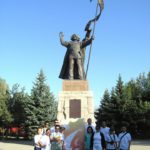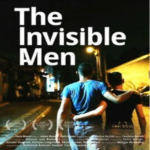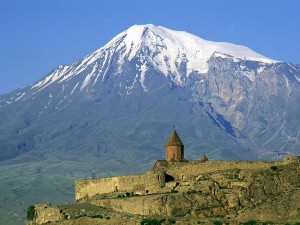 There are no legal protections for LGBT persons whose rights are overtly and covertly violated. There is fear of violence in their workplace or from within their family. As a result they do not file complaints of rights violations or criminal offenses against them. “Gay Life in Armenia” hardly means anything other than a fantasy idea from the West.
There are no legal protections for LGBT persons whose rights are overtly and covertly violated. There is fear of violence in their workplace or from within their family. As a result they do not file complaints of rights violations or criminal offenses against them. “Gay Life in Armenia” hardly means anything other than a fantasy idea from the West.
From: The Armenian Reporter
By Yelena Osipova
June 29, 2009; revised 2016
“You Are No Longer Our Son”
Last year 21-year-old Khachik, a university student from Yerevan, was thrown out of his home when his parents found out he has a “nontraditional” sexual orientation. Khachik told the Institute on War and Peace Reporting (IWPR) earlier this year that his parents said he was no longer their son and that he had to leave the house.
Khachik is far from being the only one in Armenia to face such an attitude, even from close relatives and friends. The same IWPR article quotes psychologist Davit Galstyan, who, throughout his career, has come across cases such as a mother rejecting her own children and sending them to an orphanage after learning that their father, her husband, is gay; or a father throwing out of the house his 14-year-old gay son, who then turned to street prostitution.
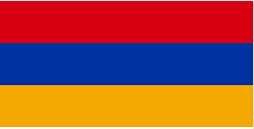 Social Outcasts
Social Outcasts
On a social level, homophobia seems to be deeply ingrained in the Armenian psyche. (National flag image left) At least some representatives of the Armenian Apostolic Church have taken the view that homosexuality is a grave sin. In an online program “My Priest,” where the Araratian Patriarchal Diocese provided answers to about a thousand questions regarding the stance of the Church on various issues, Deacon Tigran Baghumian wrote, “homosexuality is a spiritual vice and sin” and, since such relations are “unnatural,” they should be condemned. He cited various chapters from the Bible to support his view.
Interviewed in 2003 by GayArmenia.com, chairperson of the Armenian Helsinki Association Mikael Danielyan said, “Our society is either illiterate and believes that homosexuality is a disease to be treated, or people simply do not wish to accept something which is different from their traditional understanding of morality and family.”
Predictably, fringe groups like the “Armenian Aryan Order” have proposed sending gay Armenians to Europe, “as homosexuality is a part of the European values.” But the attitude is not limited to the right wing.
A prominent environmental activist, Karine Danielyan, has described homosexuality as a national security problem, citing demographic decline in Armenia.
Legal Matters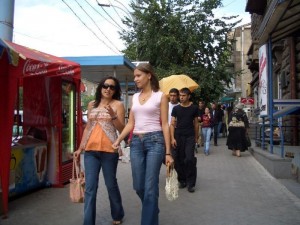
In 1922, homosexuality ceased to be a criminal offense in the newly formed Soviet Union. However, as Soviet mores grew socially conservative, it was later reintroduced into penal codes. Article 116 of the Armenian Penal Code (1961) said: “Sexual intercourse of a man with another man (sodomy) is punishable by confinement for up to five years.”
The article was repealed in 2003, after the Council of Europe set decriminalization of homosexuality in Armenia as one of the requirements for joining the organization. What is more, in December 2008, the Armenian government endorsed a UN statement against discrimination on the basis of sexual orientation and gender identity. That move caused a public outcry from some parts of the society.
The UN statement is just a declaration, however, and does not have the power of other legally binding documents.
A report, Forced Out: LGBT People in Armenia, released in February 2009 by the ILGA (International Lesbian, Gay, Bisexual, Trans and Inter-sex Association) Europe chapter and the Centre for Culture and Leisure (COC), states that the protection of human rights in Armenia is very limited in practice. The report notes that “failure to respect, protect, and fulfill the rights of the LGBT people pervades all levels of society,” be it the government, the community, or the family.
What is more, harassment and abuse by law-enforcement agents, along with institutional discrimination, still persist. Mr. Danielyan of the Armenian Helsinki Association, who has dealt with LGBT issues, has reported frequent cases of attempted extortion and blackmail by the police. In an IWPR article published in 2004, he said that the police have often taken a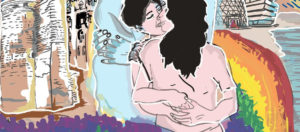 dvantage of gay men who would prefer to pay bribes rather than let the officers inform their families and employers about their sexual orientation. Furthermore, gay people can be arbitrarily detained, which is usually accompanied by verbal and physical abuse.
dvantage of gay men who would prefer to pay bribes rather than let the officers inform their families and employers about their sexual orientation. Furthermore, gay people can be arbitrarily detained, which is usually accompanied by verbal and physical abuse.
There have also been many reported cases of discrimination and abuse in the armed forces. Since homosexuality is regarded as an illness or pathology, most gays are barred from serving in the military. Those who are drafted, Mr. Danielyan says, can be later “diagnosed” with homosexuality, and sent to mental institutions for “special treatment.”
If they get to perform their service, gay conscripts face humiliation, harassment, and violence. Most gay Armenians live in fear and few dare to come out and stand up for their rights.
Problem with the Media?
There is very little publicity for gay people in Armenia. Although the ILGA-Europe/COC report suggests that to date there are no publications, radio, or TV programs about the LGBT issues in Armenia, as well as no visible movement or community activities, there has been a lot going on over the Internet. Many social networking sites and blogs (GayArmenia.com; Unzipped: Gay Armenia Blogspot; Yesoudo.com) have become LGBT venues for making new acquaintances, participating in discussions, sharing news and information, and providing mutual support. Overall, since decriminalization, the situation seems to have improved at least for some of Armenian gays.
Pink Armenia is an NGO based in Yerevan. Pink Armenia is a community-based LGBT that serves and supports the needs of the community, and promotes the LGBT persons’ human rights protection process; it advocates for the change of public policy around LGBT issues. It was started in 2007.
In the past LGBT issues were addressed by the media with mockery and ridicule. Still, references to gays often relates to crime, HIV/AIDS, drug addiction, or commercial sex.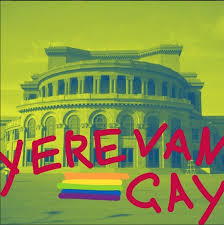
Aravot daily is one of the most popular and also one of the more independent newspapers in Armenia. In one place, it resorts to stereotyping: “As a rule, homosexuals work as hair-dressers, actors, singers, reporters, and models.” In another, it writes: “Apparently, homosexuality is already regarded as normal even in Armenia; so normal, that we have even endorsed a UN statement against discrimination on the basis of sexual orientation.” Resistance here is high.
So Pink Armenia had fought its way into the public eye. In 10 years since its founding the organization has succeeded in being known for its transparent, open and dedicated work. It has become an internationally recognized and trusted organization. The organization has established a solid partnership with local and international organizations working in the fields of sexual health, human rights protection, fight against discrimination, and gender issues.
Their role is to represent sexual minorities in a fair, accurate, and balanced way to help promote the rights of the community and work to break the vicious circle of homophobia and victimization.
One activist said, “Armenian society needs to see, listen to, and discuss with LGBT citizens. When there is no public debate or contradictory information, the old clichés and prejudices persist and continue dominating public opinion.”
Action is Needed
Laws, by themselves, cannot change the situation, unless there is a proper climate to help progress. LGBT Armenians need changes beyond simple legislative reforms: the process of change is related to many cultural and educational factors, which means mor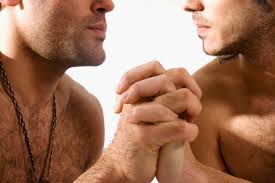 e LGBT visibility, both, in terms of activism and public involvement; greater media coverage; public awareness campaigns; and, most certainly, lobbying the political and cultural leaders within Armenia.
e LGBT visibility, both, in terms of activism and public involvement; greater media coverage; public awareness campaigns; and, most certainly, lobbying the political and cultural leaders within Armenia.
Dziunik Aghajanyan, Head of the Department for International Organizations at the Ministry of Foreign Affairs, said in an interview, “We need to advance the human rights protection with an emphasis on respect and tolerance toward another human being, irrespective of political or any other orientation that he or she might have. Society should overcome its own stereotypes, and should try getting over resisting the idea of accepting “European-imposed” human rights. After all, Europe is where Armenia is striving to get one day, isn’t it?”
Also see this other related report about gay life in Armenia: https://iwpr.net/global-voices/its-hard-be-gay-armenia
Other links:
http://www.pinkarmenia.org/en/
http://pinkarmenia.blogspot.com/
Gay Armenia News & Reports
Gay Armenia Guide
Unzipped: Gay Armenia Blogspot
Yesoudo.com

